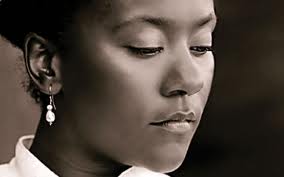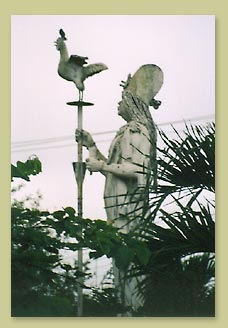by James Weeks | Jul 5, 2013 | Blog

Indra
The sun was slowly descending when I spoke to Indra.
She lives in Denmark and the further north you go it’s the land of the midnight sun, she says. By the tip of Norway, it’s bright until midnight.
But winters there are the “darkest of dark”. And that’s one of the reasons why this gifted vocalist is looking forward to moving back to the U.S.
Indra Rios-Moore isn’t exactly a house-hold name yet, but give this New-York native and daughter of Osun some time. After all, you’re dealing with a powerful force of nature. And Osun cannot be restrained.
Indra “could easily approach the leagues of the great jazz singers like Ella Fitzgerald and Sara Vaughan,” says critic, Jacob Baekgaard, in an article published on www.allaboutjazz.com.
And Bessy Reyna, a columnist for CTLatinonews.com, says: Indra “is a remarkably talented singer who can render either a bolero like “Mil Besos” or a sensual “Teach Me Tonight” with equal easy, holding her audience in an intimate and warm embrace which is nearly impossible to escape.”
Born of a Puerto Rican mother from Ponce and an African-American/Syrian father, Indra has been singing since childhood. At 14, she attended the prestigious Mannes College of Music in New York. She later studied classical vocal training at Smith College.
She sings in Portugese, English, Spanish and Italian. And although she’s drawn to traditional jazz standards, re-styled American folk and RB songs, she’s plans to include a song for Osun on her next CD which will be recorded in August 2013.
To purchase Indra’s CD’s, visit her website at: http://indra.dk/sider/info_eng.html
Here’s a clip of this daughter of Osun in action:
I am moved by Indra’s spirit and wisdom. Here’s what she had to say in our recent interview.
Why She Sings
“To be perfectly honest. I sing for myself. I sing for my own wellness. It’s something that I’ve always had to do. It’s like I have to breathe; I have to sing. That’s what keeps me going. It heals me from the inside. And when I find that other people feel a similar feeling, I feel even more compelled to do it. It’s not just helping me; it’s helping other people. It’s serving a higher power.”
When It All Began
“I first started singing when I was about four or five years old. I would sing to myself because it lifted me up. And you might think, ‘why does a four-year old child need lifting up?’ I had a good childhood. I was not abused or anything. Everything was fine. But even though everything was fine, I still needed lifting up. You don’t need to be sick in order to be healed. I think everyone needs lifting up. No matter what state you’re in you can always be higher. Higher in the sense of connectedness. For me, that’s what healing from the inside means. It means feeling more connected because we can have moments throughout the day where we find our mind wandering or perhaps we’re too far up in our head and we don’t feel connected. Connected to what? Connected to one another, the universal force, to love, to creativity, to that magical thing that happens that no one can put a name to.”
Her Love For The Orisas
“I’ve been surrounded by Santeria my whole life. Growing up in the lower east side of New York, there were lots of santeros and santeras. You would see people dressed in white and people would whisper, ‘Oh, he’s making santo, oh, she’s making santo’. My mom would always worship Yemoja because she’s a daughter of Yemoja. For me, I always knew I was a daughter of Osun. Whenever I would hear her name, I knew that she was mine and I was hers. It was not even a question in my head. Ironically, I found out from Mom that I had this little wooden figure that I would play with growing up. I asked Mom one day, ‘What is this wooden figure?’ She said: ‘I got it from a friend of mine when I was pregnant with you but didn’t know I was pregnant. He said: ‘This is from Nigeria. This is the fertility Goddess, Yemoja.’ When I heard that story, I had to learn more about the pantheon of Gods and Goddesses.”
Being Open About Her Faith
“I’ve been open about my spirituality since 2002 because when I was in college, I was studying Afro-Latin literature. I had a professor who was an iyawo at the time, and she invited me to a ceremony for Obatala. During the ceremony, Obatala recognized me as a daughter of Osun and I started to cry. He gave me a gift – a white cloth with gold figurines on it. And I remember thinking, ‘I can’t take this. I can’t accept this.’ But I couldn’t reject it because it was coming from Obatala and I felt such love for him. As soon as the ceremony was over, I tried to hand the gift over to one of my professor’s, and she looked at me and said, ‘Don’t ever reject a gift from God.’ And I said, from this moment on, I’m going to be ‘out and about’ [my faith]. It’s a spiritual gift to be cared for by a Goddess or a God – a piece of the divine energy that is connecting all of us. I can’t reject that gift nor should I hide in the shadows because others might not understand. This is something to be proud of. To be happy about. It’s a beautiful thing. It’s such an immense blessing that when I think about it, I want to cry. I feel so utterly protected, loved and cared for. During a storm, I literally feel like I am being picked up by the energies of the orisas. It protects me, loves me, and informs me when I can’t think. I don’t need to think. I just need to be quiet and listen. I feel very lucky because there are so many people who are lost. They don’t know up from down. They read books trying to find their way and that’s good. But I feel lucky that, at an early age, I could feel the energies of the orisas. I could give the energies a name, and they could live in my life.”
Before She Hits The Stage
“I always say a prayer to help me get out of the way. What I do on stage is not about performance. I’m not there to entertain. I’m there to get out of the way. My physical body contains a voice that is anatomically pretty. God created vocal chords in my throat and in my neck that operate in such a way that they produce a beautiful sound. That’s fine and dandy. There are lots of people like that. But there’s a special juice in my vocal chords and that’s God – that’s God delivering what God needs to deliver. And so I try to get out the way.”
Song For Osun
“We’re doing a song for Osun on the 3rd CD. Part of me was like: ‘Do I dare do this?’ And the answer was ‘Yes! Yes! Yes! Let’s do this. There are always those people in our community that are gonna say: ‘You didn’t do that properly. You need to do the songs in the right order.’
Well, call me naive, but I really feel that if you do things with the right intent, that means more than the ritual. The ritual is a process that we carry forward generationally to embody something that is more than the physical. Ritual exists for a purpose and that purpose is important. But the intent is 99% of it. If you go in there with the wrong intent, but the right ritual, what’s that going to serve? I feel moved to do this song, and if I do it with all my heart, and Osun knows how much I love her, then how can I go wrong?”
By James Weeks
Producer, Across The King’s River
by James Weeks | Jun 11, 2013 | Blog

Osun Festival in Osogbo – photographer unknown
The truth is that it's not as difficult as most Westerners make it out to be. In fact, if you can say Sango, or Ifa or Alaafia, there's absolutely no reason why you can't learn conversational Yoruba. You just have to make the effort to step your game up.
If it's not impossible to learn Yoruba what's holding folks back?
I'm not sure. I think most people in the Americas have gotten so used to people not speaking Yoruba that they've bought into some subconscious myth that says mastering “alaafia” is as far as you can humanly go.
Well it's time to bust that myth up once and for all. Here are some tips that have helped me on my journey to learning and speaking Yoruba:
Make It A Daily Ritual:
Let's get real. You need to take action. The language isn't just going to flow into your head without any effort on your part. If you really want to learn the language, then you need to make a commitment to study it every day. One of the best foundational books on Yoruba is Je K'A So Yoruba by Professor Antonia Yetunde Schleicher. Set a goal of studying for at least 30 minutes a day. Consider making it part of your daily spiritual routine.
Forget About The Tones:
Yoruba is a tonal language. A word can have several different meaning depending on the tones. This is where most folks miss the boat. They get so overwhelmed thinking they have to master each and every tone, they give up in frustration. Instead of stressing over the tones,simply listen to words as you hear them and try your best to repeat them melodically. Think about it. Isn't that how you learned English? By repeating what you heard? Do you think babies in Yorubaland start speaking by learning tones? Stop stressing about the tones and just go with the flow.
Focus on Greetings and Simple Phrases
Learn basic greetings and simple phrases. Learn how to say: Good morning! Did you sleep well? How is your husband? Your Wife? The Kids? How's work? Learn how to say who, what, where, when why. Learn how to count from 1 to 10. Then build and expand your vocabulary as you make progress. I never understood and I still don't understand why many people begin their Yoruba studies by trying to master esoteric Odu Ifa or incantations without first having the most basic understanding of the language. Start with the basics.
Practice, Practice, Practice
Practice by speaking to native speakers every chance you get. Or, practice with others who are studying the language. One of my best friends is a native Yoruba speaker and speaking to him every day helped me to progress rapidly in the early stages of learning the language. Now that Skype is readily available, you can befriend and speak to native Yoruba speakers anywhere in the world.
Remember You're On A Journey
Your study of Yoruba, or any language for that matter, can open doors for you and can enrich you spiritually, culturally and intellectually. Take time along the journey to celebrate each milestone. With commitment you can be speaking fluent conversational Yoruba in less than two years. Never give up. Keep your eye on the prize.
James Weeks/Producer, Across The King's River
by James Weeks | May 23, 2013 | Blog
The fight is on…

Chief Aseda
A nasty battle in the Spirit World, but my elders in Nigeria say we’ll win.
That’s what my friend, Ade Kunle, revealed to me on a gorgeous Sunday in Oakland. “We have to fight the ajes (witches),” he told me in Yoruba. This was not the kind of conversation I was hoping to have on a lovely Sunday afternoon.
I just wanted a little exercise…
So there I was, getting ready to walk around Lake Merritt, soaking in the sun, the salsa music, the fresh air and BOOM – next thing I know, I run into Ade Kunle and he starts talking about witches.
On a Sunday afternoon — my Sunday afternoon.
But I suppose it was a conversation that needed to happen. At least, that’s what the elders say.
But why?
Well, according to Ade Kunle, who was speaking on behalf of the elders, who, in turn, were speaking on behalf of Ifa, the ajes needed to be appeased with a major sacrifice or they would retaliate against my family.
And things could get ugly, Ade Kunle added. Very ugly. In fact, “eniyan le ku (someone could die).
But why were the witches so pissed off that “eniyan le ku?”
Well, because I’m an Ifa priest and I’ve busy “undoing” the work of the ajes. See, some ajes are up to no good. They wreak havoc in folk’s lives. So whenever I help a client spiritually, though the power of Ifa, I’m basically undoing the work of ajes.
I mean, think about it. Put yourself in the shoes of the ajes for one minute. If you’ve been busy creating problems for folks, and some Ifa priest comes along and messes up your work, wouldn’t you be pissed off?
Be honest, now. Not even a little bit?
To be fair, not all ajes are up to no good, so don’t get it twisted. In fact, some ajes are friends of humanity. My friend, Ade Kunle, says there many kinds of ajes. But in the interest of simplicity, (at least for now), let’s just say that “Aje funfun” are your friends and “aje alakita” are your foes.
Even though I’m sure it’s a waaaaaaaay more complicated than that…
In this on-line article, the well-known Iyanifa, Chief Fama, says there’s a “huge difference between the aje of Yoruba mythology and the witch of Western mythology. The analogy here can best be compared to Esu of the Yorùbá myth and Satan/Devil of the Christian mythology. Just as Esu wields a powerful influence in Yorùbá religion, Aje wields enormous power,” Fama says.
I suppose it’s great to know that ajes can be a force of good in our world. And who knows, maybe one day I’ll have the pleasure of meeting and working with them.
But in the meantime, the elders said we need to deal with the ajes that were threatening to kick down the front door and take innocent lives as they please.
And so the elders did an ebo in Nigeria that went on every day for three weeks. I’m told that a team of more than 10 priests worked on it. (It was hella costly too, ouch!) But I am grateful. I am free to continue Ifa’s mission while undoing the work of ajes without fear of retaliation.
When I told my Tulani, my 25-year-old daughter, about the spiritual battle with the ajes, she said: “Damn those ajes. Who the hell do they think they are?”
That’s a great question. Who do those ajes think they are?
What about you? Have you been dealing with any ajes lately? At work? At home? During your sleep?
Hopefully, you’ll never have to deal with the same brand of ajes that I had to fight off, but maybe your aje goes by a different name. Maybe your aje is fear that keeps you from being your true self and moving forward in life. Or maybe it’s the lack of discipline and focus. Or maybe your aje is your inability to forgive yourself or others for past mistakes.
Take your pick, then pick your battle. I’ll be in your corner praying for your success.
Blessings
James Weeks
Producer, Across The King’s River
by James Weeks | May 3, 2013 | Blog
So you’ve set up an altar (or shrine) for your ancestors, and you make regular offerings to them. Yet, you find yourself wondering if you’re truly connecting with Spirit or merely going through the motions.
Here are some tips that I’ve found helpful for building a stronger connection with your Egungun (ancestors). 
MAKE IT A PRIORITY: Your relationship with your ancestors is just that – a relationship. And like any relationship, you need to be fully committed in order to make it work. You also need to make sure that you are available if you want them to communicate with you. This means spending time in silence, prayer, meditation or any activity that uplifts your spirit or slows down the rhythm of your life so that meaningful spiritual communication can take place.
BE GENEROUS: Yes, the ancestors can guide and help you in ways beyond your imagination. But never approach them with a list of demands. Your loved ones in Spirit work with you but not for you – it’s a partnership. Be prepared to give, not merely receive. Remember, your ancestors are not “dead”; they are alive in another dimension and are still learning and growing. The Egungun are fully aware of your thoughts and feelings, so be sure to send them positive energy and love to support them on their spiritual journey too.
BE OPEN: Despite what some people might have you believe, the ancestors have no limitations
when they want to communicate with you. They can use anyone or anything to deliver a message: they can communicate through dreams, feelings, inspiration, nature, literature and music. And they are not stuck in the past. They are fully aware of modern technology and can manipulate lights, television sets and even cell phones to get your attention. Be open and alert. They know you well and will use the best method to get through to you.
BE TRUSTING: Don’t expect a lightening bolt from the sky. Messages from Spirit are often subtle, soft. So subtle that you might miss them. Pay attention to your feelings because ancestors often communicate through feelings – not words. Pause for a moment. How do you feel right now? Where is it that feeling coming from? Is it coming from you or from Spirit? What inspired you to read this article? Was it your idea or did your ancestors inspire you to read this? Spirit is all around you and guide you more than you realize. Trust what you feel inspired to do.
TAKE ACTION: Don’t waste Spirit’s time. One of my mentors said this to me one day. It takes a lot of energy for your ancestors to communicate with you. And you’re wasting their time if you never listen or do anything to move your life forward. Are you living in fear or faith? Are you taking steps to empower yourself? Are you empowering others? Are you leaving a legacy that others might aspire to follow? Take at least one step each day to move your life forward. Your ancestors are alive and well. Make them proud by living your life to the fullest.
Blessings
James Weeks
Producer, Across The King’s River
by James Weeks | Oct 11, 2012 | Blog
The door suddenly blew open while conversing with Ade Kunle in my living room. Thinking it was merely the wind, I arose and shut it again.
But it wasn’t the wind, Ade Kunle explained.
It was a Spirit. A powerful, familiar one. It was Baba Aseda, a man we both revere as a father because he’s always been there for us. Through the power of orisa, he has guided us through many challenges over the years. 
Aseda is one of the 16 major Ifa diviners in the world, and in the spring of 2003, he initiated both of us into the orisa tradition.
His presence calms us. His face graces my website and two of our King’s River T-shirts. (You can order our latest design here: Official King’s River Merchandise)
He is without doubt one of the driving force behind what I do – and what my ancestors insist I must become.
According to Ade Kunle, the front door swinging open was Aseda’s way of making sure his presence is felt, proof that he’s listening to our conversation and monitoring every word.
I don’t doubt this but why was the old man visiting now?
Because I had just inquired about a secret, a mysterious, spiritual power that both Aseda and Ade Kunle have knowledge of. I know nothing about this power and was hoping, once again, that Ade Kunle would tell me about it, or at the very least, give me a hint.
Opening the door and entering in Spirit was Aseda’s gentle way of saying certain secrets must remain secrets. However, I’ve been told that eventually I will understand this mysterious power on my own.
I love mysteries and the Yorubas safeguard many of them. In Yoruba culture, just because an elder knows your destiny, don’t think that he/she will reveal it to you all at once. You’ll be waiting for a long time.
A little information now and a bit more information later, perhaps. I’ve learned to be patient. If the seers reveal everything to you how can there be room for self-discovery and self-mastery? It’s similar to wanting to be buff without going to the gym.
I was grateful for Aseda’s surprise visit in Spirit and was happy to finally see Ade Kunle in person again. It’s been more than a year since the brutal U.S. recession forced him to leave Oakland, CA and move back to Nigeria.
I looked younger, he told me, better than I looked when we last saw each other. I was happy to hear that. Who knows? Perhaps leaving Corporate America to work on my film miraculously restored my youth.
Ade Kunle looked good, too. A lot more gray flecks in his beard, though. And a lot more pensive than I’ve ever seen him before.
“I’m not the same Ade Kunle as before,” he tells me. The elders have taken him to deeper places, he explained. And he’s been exposed to strong rituals. Rituals far beyond the understanding of many in the Diaspora.
And he hinted at other mysteries: powerful medicines and soaps that he brought from Nigeria, powerful people that I will meet during my next trip to Nigeria, spiritual things that the elders are doing to support the upcoming film.
How he managed to get strong medicine into the U.S. was fascinating. At the airport in Nigeria and at each layover on his way back to Oakland, he uttered powerful incantations in Yoruba each time security personnel reached into his carry-on bag to try to take the bottled-liauids per airline regulations.
My conversation with Ade has inspired me all over again. There are many things that I dislike about Nigeria: corruption, mismanagement at every level, grinding poverty and pollution, hostility in high and low places.
Yet the more I journey into his culture, the more I realize I am a Yoruba at heart and have the backing of powerful souls that have a lot to say to the world. My task is to humbly step aside and allow these souls to speak.
For the first time in a very long time, I look forward to returning home.
Blessings





